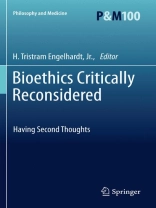Bioethics developed as an academic and clinical discipline during the later part of the 20th century due to a variety of factors. Crucial to this development was the increased secularization of American culture as well as the dissolution of medicine as a quasi-guild with its own professional ethics. In the context of this moral vacuum, bioethics came into existence. Its raison d’être was opposition to the alleged paternalism of the medical community and traditional moral frameworks, yet at the same time it set itself up as a source of moral authority with respect to biomedical decision making. Bioethics serves as biopolitics in so far as it attempts to make determinations about how individuals ought to make medical decisions and then attempts to codify that in law. Progressivism and secularism are ultimately the ideology of bioethics.
Tabella dei contenuti
A Skeptical Introduction to Bioethics – H. Tristram Engelhardt, Jr..-
I. History of Bioethics: Four Perspectives.-
Beginning Bioethics – Michael S. Yesley.-
The Genesis of a Totalizing Ideology: Bioethics’ Inner Hippie – Griffin Trotter.-
Bioethics and Professional Medical Ethics: Mapping and Managing an Uneasy Relationship – Laurence B. Mc Cullough.-
Two Rival Understandings of Autonomy: Paternalism, and Bioethical Principlism – Aaron E. Hinkley.-
II. The Practice of Bioethics and Clinical Ethics Consultation: Three Views.-
Bioethics as Political Ideology – Mark J. Cherry.-
The “s” in Bioethics: Past, Present and Future – Ana S. Iltis and Adrienne Carpenter.-
Why Clinical Bioethics So Rarely Gives Morally Normative Guidance : Some Critical Reflections – H. T. Engelhardt, Jr..-
III. The Incredible Search for Bioethical Professionalism: Some Final Critical Reflections on Circular Thinking.-
On the Social Construction of Health Care Ethics Consultation – Jeffrey P. Bishop.-
Notes on Contributors.-
Index.












